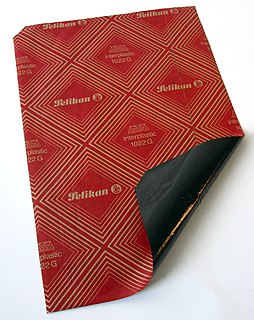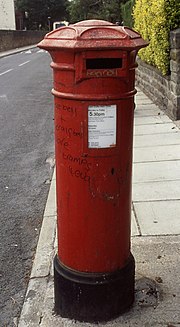
Carlill v Carbolic Smoke Ball Company [1892] EWCA Civ 1 is an English contract law decision by the Court of Appeal, which held an advertisement containing certain terms to get a reward constituted a binding unilateral offer that could be accepted by anyone who performed its terms. It is notable for its treatment of contract and of puffery in advertising, for its curious subject matter associated with medical quackery, and how the influential judges developed the law in inventive ways. Carlill is frequently discussed as an introductory contract case, and may often be the first legal case a law student studies in the law of contract.

The posting rule is an exception to the general rule of contract law in common law countries that acceptance of an offer takes place when communicated. Under the posting rule, that acceptance takes effect when a letter is posted ; the post office will be the universal service provider, such as the UK's Royal Mail, the Australia Post, or the United States Postal Service. In plain English, the "meeting of the minds" necessary to contract formation occurs at the exact moment word of acceptance is sent via post by the person accepting it, rather than when that acceptance is received by the person who offered the contract.

Offer and acceptance are generally recognised as essential requirements for the formation of a contract, and analysis of their operation is a traditional approach in contract law. The offer and acceptance formula, developed in the 19th century, identifies a moment of formation when the parties are of one mind. This classical approach to contract formation has been modified by developments in the law of estoppel, misleading conduct, misrepresentation, unjust enrichment, and power of acceptance.

Felthouse v Bindley [1862] EWHC CP J35, is the leading English contract law case on the rule that one cannot impose an obligation on another to reject one's offer. This is sometimes misleadingly expressed as a rule that "silence cannot amount to acceptance".

Entores Ltd v Miles Far East Corporation [1955] EWCA Civ 3 is a landmark English Court of Appeal decision in contract law on the moment of acceptance of a contract over telex. Denning LJ found that the regular postal rule did not apply for instantaneous means of communications such as a telex. Instead, acceptance occurs when and where the message of acceptance is received.

Butler Machine Tool Co Ltd v Ex-Cell-O Corp (England) Ltd [1977] EWCA Civ 9 is a leading English contract law case. It concerns the problem found among some large businesses, with each side attempting to get their preferred standard form agreements to be the basis for a contract.

Rose & Frank Co v JR Crompton & Bros Ltd [1924] is a leading decision on English contract law, regarding the intention to create legal relations in commercial arrangements. In the Court of Appeal, Atkin LJ delivered an important dissenting judgment which was upheld by the House of Lords.

Henthorn v Fraser [1892] 2 Ch 27 is a decision of the Court of Appeal of England and Wales dealing with the postal rule in English law of contract formation.
Dunlop v Higgins [(1848) 1 H.L.C. 381] was an early decision confirming the postal rule in the Scots law of contract formation. The decision was based on the earlier case of Adams v. Lindsell.

Brogden v Metropolitan Railway Company (1876–77) L.R. 2 App. Cas. 666 is an English contract law case which established that a contract can be formed by the conduct of the parties.
In re Imperial Land Company of Marseilles, ex parte Harris (1872) Law Rep. 7 Ch. App. 587, also known as Harris's case, is an English contract law case. It reconfirmed the postal rule of Adams v Lindsell (1818).
Stevenson, Jaques, & Co v McLean [1880] 5 QBD 346 is an English contract law case concerning the rules on communication of acceptance by telegraph. Its approach contrasts to the postal rule.

Lefkowitz v. Great Minneapolis Surplus Store, Inc 86 NW 2d 689 is an American contract law case. It concerns the distinction between an offer and an invitation to offer. The case held that a clear, definite, explicit and non-negotiable advertisement constitutes an offer, acceptance of which creates a binding contract. Furthermore, it held that an advertisement which did not clarify the terms of its bargains, such as with fine print, could not then be modified with arbitrary house rules.
The Household Fire and Carriage Accident Insurance Company (Limited) v Grant (1878–79) LR 4 Ex D 216 is an English contract law case, which concerns the "postal rule". It contains an important dissenting judgment by Bramwell LJ, who wished to dispose of it.

Byrne & Co v Leon Van Tien Hoven & Co [1880] 5 CPD 344 is a leading English contract law case on the issue of revocation in relation to the postal rule. In it Lindley J of the High Court's Common Pleas Division ruled that an offer is only revoked by direct communication with the offeree, and that the postal rule does not apply in revocation; while simply posting a letter counts as a valid acceptance, it does not count as valid revocation.
Hyde v Wrench [1840] EWHC Ch J90 is a leading English contract law case on the issue of counter-offers and their relation to initial offers. In it Lord Langdale ruled that any counter-offer cancels the original offer.

Holwell Securities Ltd v Hughes [1974] 1 WLR 155 is an English contract law case overriding the usual postal rule. Ordinarily, a contractual offer can be deemed to be accepted when it leaves the offeree and enters the postal system.

Dickinson v Dodds (1876) 2 Ch D 463 is an English contract law case, heard by the Court of Appeal, Chancery Division, which held that notification by a third party of an offer's withdrawal is effective just like a withdrawal by the person who made an offer. The significance of this case to many students of contract law is that a promise to keep an offer open is itself a contract which must have some consideration.

Power of acceptance is a concept of contract law. It refers to the power vested in the offeree by the offeror through the offer being made. It is used to determine whether the acceptance of an offer is valid.

Ellefson v. Megadeth, Inc. 2005 WL 82022 was a contracts case tried in the United States District Court for the Southern District of New York in 2005, in which the court determine to enforce a settlement agreement page signed and sent by fax, as an acceptance of a contract or as a counter offer.












